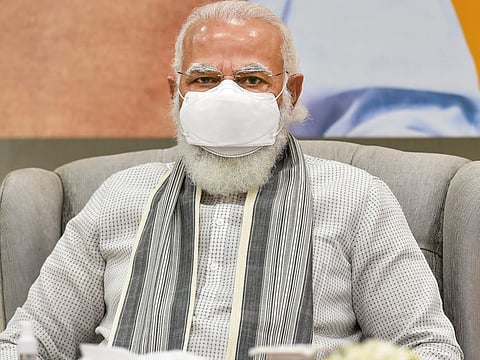COVID-19: Virus surge after festive season, elections likely in India
India must ensure that virus safety measures are not violated at this juncture

India’s battle against Coronavirus is going through a critical phase. While daily positive cases are declining, the country’s viral load is gradually inching to cross that of the United States in the coming weeks. On October 20, for example, India reported 47,000 cases, lowest in three months and the daily spike, going by the recent trend, has steadied at around 65,000, a significant decline from September when it almost touched 100,000 per day.
Still, citing the festive season coinciding with the advent of winter, epidemiologists have issued warnings about a potential surge. Addressing the nation on Monday, seventh since the pandemic began, Prime Minister Narendra Modi, warned his countrymen of complacency. Till a vaccine is available the virus remains a serious threat, he said, asking people to be vigilant and follow safety precautions especially in the wake of the festive season.
Bihar is home to millions of migrants who may start returning in large numbers to big cities after the elections, rice harvest season and festivals are over next month. This raises the possibility of infections spreading beyond the stateGulf News
While Modi asked people to be cautious, he remained silent on election related activities in Bihar, a state of over 100 million people going to polls next week. Modi’s party is seeking to retain Bihar that has a young population, has the highest rate of unemployment and ranks poorly in health and socio economic parameters. Coronavirus safety rules are ignored by all parties, including Modi’s BJP. Taking a serious note of crowded election rallies, India’s Election Commission on Wednesday expressed dismay at violation of social distancing norms and people attending such meetings without masks. Hitting out at the parties, the commission threatened to invoke penal provisions.
Serious health risk
Under India’s Disaster Management Act, people violating safety can be jailed for two years but that is unlikely to deter political parties or the candidates. These rallies are a serious health risk and a post-election surge in infections cannot be ruled out. Also, Bihar is home to millions of migrants who may start returning in large numbers to big cities after the elections, rice harvest season and festivals are over next month. This raises the possibility of infections spreading beyond the state of Bihar.
On Wednesday, India lifted restrictions on foreigners and people of Indian origin travelling to India for non-tourism purposes, a major step to allow international air travel after the country restricted international air travel. While the move is welcome, India must ensure that virus safety measures are not violated during festivals and elections to keep daily infections in check — a perquisite for normalisation of international travel.
Sign up for the Daily Briefing
Get the latest news and updates straight to your inbox







